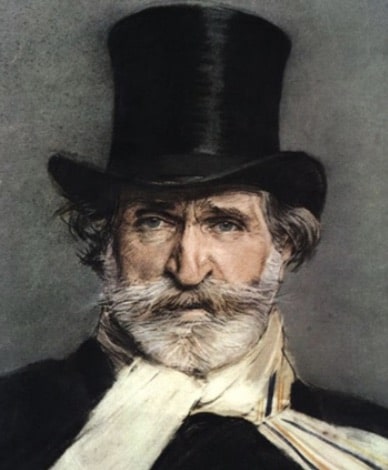
Giuseppe Verdi was born on October 9, 1813, in Le Roncole, a small village in the Duchy of Parma, which is now part of Italy. The son of a tavern owner, Giuseppi grew up in a modest family. His musical talent was evident at an early age, so the local church organist Baistrocchi provided him with some basic music education. When Giuseppe was eight years old, Baistrocchi died and Giuseppe became the official paid organist. However, when Verdi’s talent caught the attention of Antonio Barezzi, the wealthy merchant of Busseto became his patron and supported his musical education. Verdi studied under the guidance of Ferdinando Provesi and Vincenzo Lavigna–two accomplished musicians.
Verdi’s career as a composer took off with his first opera, “Oberto, Conte di San Bonifacio,” which premiered in 1839. However, it was his third opera, “Nabucco” (1842), that brought him significant recognition and established him as a leading composer in Italy. As Verdi entered middle age, he composed some of his most famous operas, including “Rigoletto” (1851), “Il Trovatore” (1853), and “La Traviata” (1853). These operas are known for their compelling stories and unforgettable arias.
In his later years, Verdi continued to compose masterpieces like “Aida” (1871) and “Otello” (1887). His final opera, “Falstaff” (1893), is considered a crowning achievement and showcases his skillful use of comic elements. Verdi was not only a prolific composer but also a passionate supporter of Italian unification. His opera “Nabucco” was seen as an allegory for the struggles of the Italian people, and Verdi’s music became a symbol of the Risorgimento, the movement for Italian reunification.
Giuseppe Verdi’s contributions to opera are immeasurable. His works continue to be performed worldwide and remain an integral part of the operatic repertoire. His operas are celebrated for their emotional power, beautiful melodies, and complex characters. Giuseppe Verdi died on January 27, 1901, in Milan, Italy from complications that followed a stroke. HIs works, known for their emotional depth, memorable melodies, and dramatic intensity, played a significant role in the development of Italian opera in the 19th century. His enduring legacy in the world of opera and his contributions to Italian culture make him one of the most celebrated composers in history. His operas remain an essential part of the classical music canon and are cherished by opera enthusiasts around the world. Though his death marked the end of an era in Italian opera, his music continues to captivate audiences and influence composers to this day.
The passion that Verdi brought to his art is captured in his comment: I adore art…when I am alone with my notes, my heart pounds and the tears stream from my eyes, and my emotion and my joys are too much to bear.
